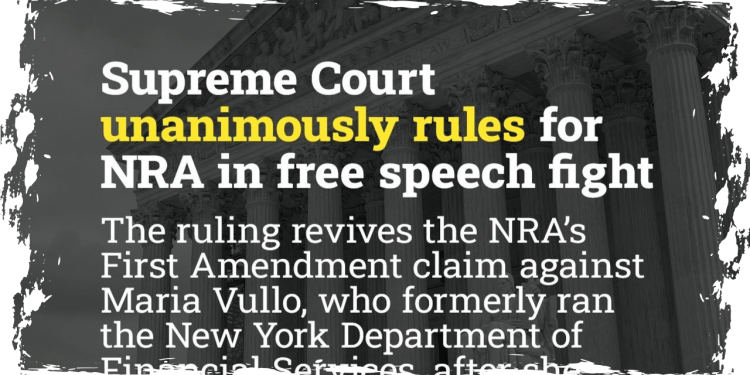In a landmark decision on Thursday, the Supreme Court unanimously upheld the National Rifle Association’s (NRA) right to continue its legal battle against a former New York regulator, citing the importance of free speech.
Liberal Justice Sonia Sotomayor authored the ruling, which revives the First Amendment claim of the gun-rights group against Maria Vullo, the former head of the New York Department of Financial Services.
In 2017, Vullo initiated an investigation into the NRA. As a result, she urged the insurers and banks under her regulation to cut their connections with the gun-rights organization. This move came in response to the tragic Parkland, Florida school shooting which claimed the lives of 17 students and staff members, and sparked a nationwide discussion on gun control measures.
The NRA argued that Vullo’s actions went beyond acceptable advocacy and violated the Constitution by coercing the government.
Thursday’s decision allows the NRA’s case to move forward, but it does not guarantee a victory for the gun-rights group in the long run. The justices emphasized that the burden of proof will increase in later stages of the legal process. Furthermore, they clarified that Vullo could still be granted qualified immunity by a lower court, even if her actions were deemed unconstitutional.
According to Justice Sotomayor, Vullo had the freedom to criticize the NRA and pursue the acknowledged violations of New York insurance law.
According to the opinion, the power of the individual mentioned in the complaint was not used to threaten enforcement actions against entities regulated by the DFS with the intention of punishing or suppressing the NRA’s advocacy for promoting guns. However, the complaint alleges that this is exactly what Vullo did, thereby violating the First Amendment, as stated by the Court.
Unusual battle lines were drawn in the case.
In a surprising turn of events, the American Civil Liberties Union (ACLU) and the National Rifle Association (NRA) joined forces to fight a legal battle before the high court. Despite their stark differences on the interpretation of the Second Amendment, the ACLU represented the NRA in this case. This unexpected collaboration marked the first time these two groups had come together in such a manner.
“This ruling is a significant triumph for the NRA and all those who value our First Amendment rights,” declared William A. Brewer III, the NRA’s counsel, in a statement. “The decision affirms what the NRA has always maintained: that New York government officials misused their authority in an attempt to stifle political opposition. It is a victory for the NRA’s millions of members and the fundamental liberties that characterize America.”
Vullo’s lawyer argued that her investigation was considered acceptable government speech and justified law enforcement.
The regulator initiated an investigation into insurance programs that were endorsed by the NRA, prompting certain companies to admit that their programs were in violation of the law. The NRA also criticized comments made by Vullo during a supposed private meeting with Lloyd’s, a major insurance company.
According to Katyal, the Court’s decision emphasizes that the ruling had to consider the NRA’s untested allegations as true, despite lacking evidentiary merit. He further asserts that the NRA’s claims regarding the Lloyd’s meetings are false, and that Ms. Vullo did not engage in any threatening, coercive, or retaliatory behavior in the execution of her duties.
During the Supreme Court hearing in March, the NRA’s arguments seemed to convince a number of justices. However, there was a moment when Justice Sotomayor, who wrote the majority opinion, expressed some disagreement.
According to the Supreme Court’s opinion on Thursday, Justice Sotomayor emphasized that the First Amendment strictly prohibits government officials from selectively punishing or suppressing speech, whether directly or through private intermediaries.
While all the justices agreed with Sotomayor’s opinion, two members of the bench also penned their own separate writings.
In a concise and straightforward manner, Justice Neil Gorsuch, a conservative member of the court, provided additional clarification on his interpretation of the ruling.
In a concurring opinion, Justice Ketanji Brown Jackson, who holds a liberal stance, criticized the lower courts for combining the NRA’s claims of censorship and retaliation. She emphasized the need to separate these claims and urged for a thorough examination of the case.
According to Jackson, it is important for the parties and lower courts to carefully examine the censorship and retaliation theories separately, taking into consideration the difference between government coercion and whether or not it violated the NRA’s constitutional rights.










